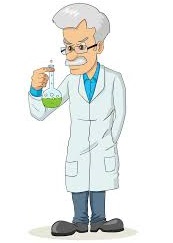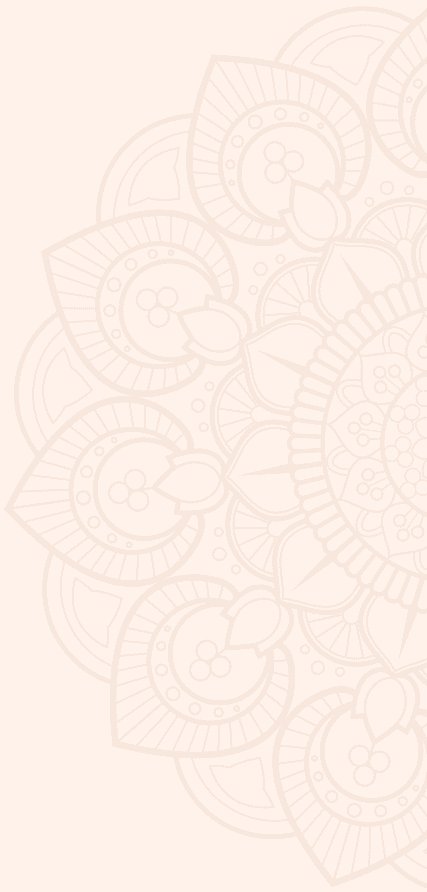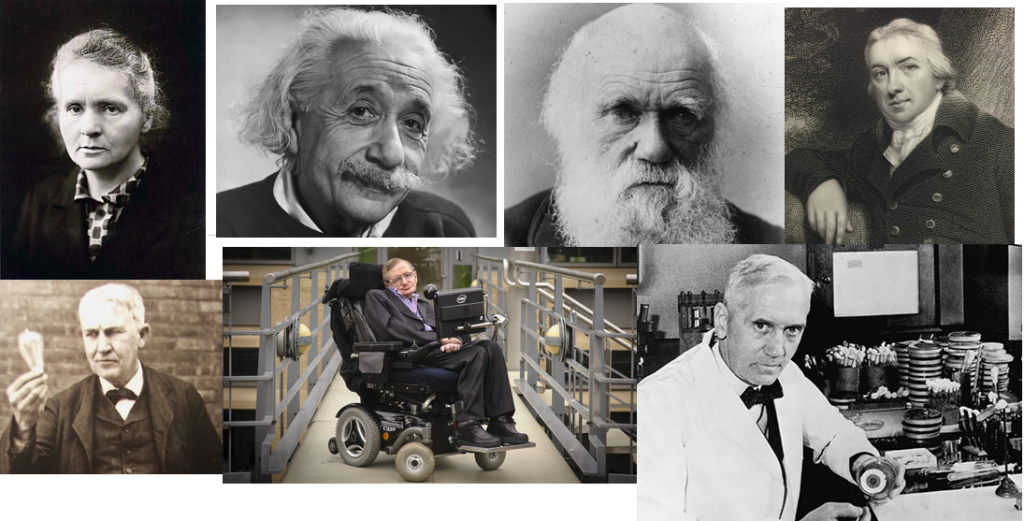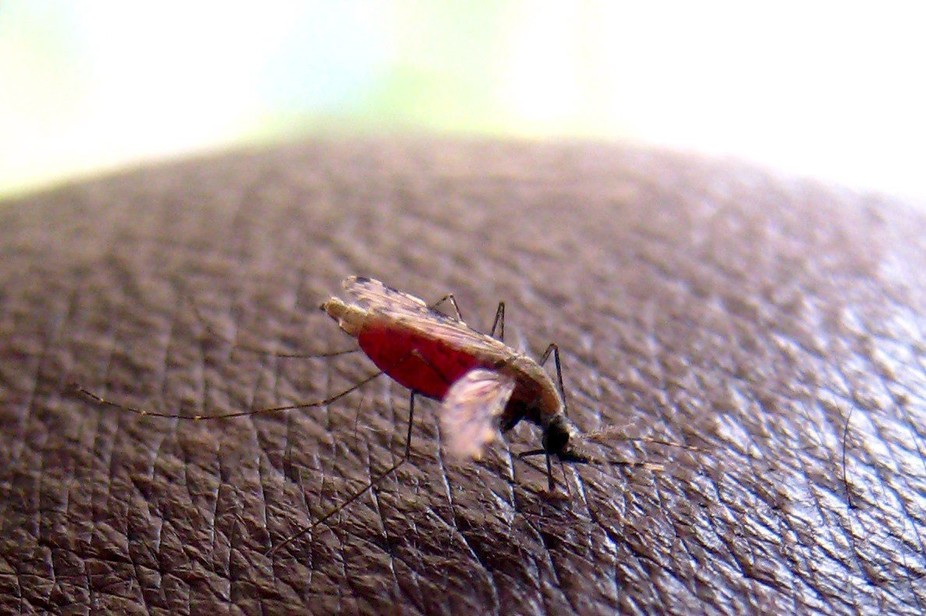
The face of science
Do you recognize any of the faces on this collage?
<You don’t have to be madly fanatic about science to recognise two. If I told you the names of the rest – you would most likely have a vague memory of their accomplishment.
Top row: Marie Curie, Albert Einstein, Charles Darwin, Edward Jenner
Bottom row: Thomas Edison, Stephen Hawkins, Alexander Fleming.
I will not bore you with the details of why each of these are famous scientists – for once, you have some homework – you find out!
However, the point I am making is this.
None of these fellows have a face that my nephews and nieces look at and think…
‘Look at this fellow, he looks just like ‘Uncle Omondi’, I can be like him when I grow up’
In fact, one particular face is used a lot in visual jokes about scientists. Scientists are often portrayed as aging white men. To ‘spice’ them up, they will be useless with women, impossible to have decent conversations with and easy to con.
‘I want to be a scientist’ ….. are not words we hear our children say in earnest.
Let’s examine the situation……
When my nephew was in high school, I was scrolling the ‘inspirational books’ section in a supermarket (and aren’t these stuffed!) for something that would inspire him into science. There were tonnes on how to get rich quick, get your dream job, make your marriage work etc. But all I could get with some bearing on science was Dr Ben Carson’s ‘Gifted hands’ – the life story of the first African-American paediatric neurosurgeon.
Feeling the lack of option, I bought it for him. Happens that he had already read it many times over and he dreamt of becoming a neurosurgeon – and he was not alone. For several years in a row, Kenya’s top students in primary school wanted to be not just doctors, but neurosurgeons.
2012
https://www.standardmedia.co.ke/article/2000053206/top-boy-in-nyanza-wants-to-be-neurosurgeon
2015
http://www.capitalfm.co.ke/news/2015/12/the-top-students-in-2015-kcpe-exams/
2016
https://www.the-star.co.ke/news/2016/01/07/top-busia-pupil-inspired-by-carson_c1270998
I can see why Ben Carson’s book has more pull than others on the shelf. He looks so much like one of their uncles/cousin/dad ….kids can relate to him. But how limiting – that this is all our kids can get (especially after he has muddied waters by aligning himself with Trump – let me not get started!).
When I started off as a science journalist, I attended a number of workshops organised by Rachel Jones , that brought together local scientists and journalists. Wondeful workshops marred by a comment one of the journalists made to me once.
‘…local guys are just spanner boys for the mzungu’
Implying that Kenyan scientists in our research institutes were just collecting and handing data and samples to foreigners and were not themselves producing anything.
Spanner boys not mechanics doing the ‘proper’ work – what a picture….
It did spur me to collaborate with one of the editors to run profiles on East African women in science. However, I am not satisfied that our young population is seeing enough faces of Africans succeeding in the world of science.
This is the reason, I am partnering with the School Engagement Program at the KEMRI/Wellcome-Trust program to write a book profiling African scientists. This book shall be freely available to children in Kenyan schools as a hard copy and shall be free to download online.
We would like to invite you to propose names of African scientists who you believe have made an impact in population health or health science. The process will take some time but I believe we shall arrive at a good read. Children will finally have a book with faces they can look at and say
‘ …that looks like Aunt Nekesa…. And is that Uncle Omondi?… oh wow I can do that too!’
Please follow this link to make your nomination of outstanding health researchers from Sub-Saharan Africa
Nominate an African health researcher for the book
Thank you
Comment
Comments are closed.




Yvonne Wabai
Well, thank God I came across this article when I did. I am a young Kenyan scientist myself, and I have had interactions with non-African and African scientists alike. Non-African scientists usually look at me dubiously, as if asking themselves, “An African scientist? What a scam!” And some of them actually throw that in my face! As a resultof such attitudes, most African scientists have little confidence in themselves. But I can tell you for sure that African scientists have done a lot of research. If it’s not on the shelves collecting dust, it’s out there in someone else’s name. The same goes for women scientists, African or not (most famous example being Rosalind Franklin whose DNA research was stolen from her). Also, getting your research published as an African scientist is so much tougher as there are many more roadblocks so many African scientists tend to publish in African science journals which are then scorned upon… It’s like there’s no way to win. But still we persist. We will not let then push us down or define us. I’m set to publish my first works soon – let the games begin – and, depending on how it goes, it will be late this year, or next year. I worked on the teratogenicity of traditional plants. My friends worked on antinociceptive and anti-inflammatory properties of traditional plants. We’ve got medicine in these plants, we just need to isolate and patent these compounds. We could be manufacturing our own medicines. Sidenote: some German scientists came and took a plant from Maasailand and patented an anticancer compound from the plant using research from our scientists and they’re using it over there now. What do we get in return? Nothing. Also, the government needs to support research and innovation more. Did you know they slashed the money allocated to universities? Research here is more of an afterthought than anything, and that needs to change. I look forward to seeing that book. In fact, let me start gathering names to nominate.
Yvonne Wabai | https://yvonnewairimuwabai.weebly.com